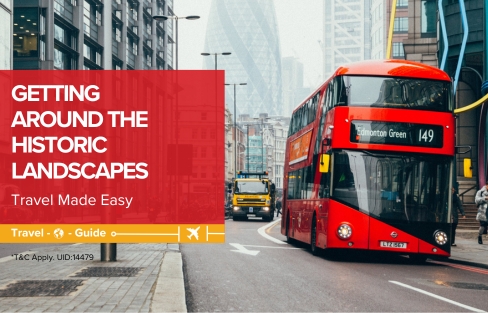

UK - Public Transportation & City Rides
- Introduction
- Visa
- Features
- Types of Visas
- Non – Immigrant visas
- Immigrant visas
- Application process
- Validity
- When to apply
- Documents required
- Visa fee
- Visa status
- Visa processing time
- Conclusion
Foreign nationals wishing to enter and remain in the UK for a specified reason, such as job, study, tourism, or family visits, must first get a visa from the British government. There are various visa categories, and each has its own requirements for the qualifying and application process. The permitted activities and length of stay are normally outlined in the visa. Most non-UK citizens must get a visa in advance of visiting the UK.
Did you know?
- Do you know that the United Kingdom provides a unique visa called the "Exceptional Talent Visa"? This visa is intended for people whose fields of specialisation, such as science, the arts, engineering, humanities, or digital technology, are recognised as having leaders or up-and-coming leaders.
What is UK Visa?
Foreign nationals must have a UK visa in order to legally enter and remain in the country for certain purposes, such as jobs, study, travel, or visiting family. It can be obtained by submitting an application that calls for completing eligibility requirements, supplying required paperwork, and paying relevant fees. The sort of UK visa you need will depend on your planned use and length of stay.
Features of UK Visa
Travel tip: Prior to departure, review the features of your UK visa. Duration, permitted activities, and any limitations. To guarantee a comfortable and legal vacation to the UK, stay informed.
A UK visa gives visitors several important benefits. Depending on the type of visa, it allows for temporary entrance and lawful residence in the United Kingdom. Visas can be obtained for a variety of reasons, including travel, job, education, or family reunion. They demand strict eligibility requirements, such as financial security and ties to the country of origin. Overstaying a visa or breaking its terms, however, might result in fines or deportation. In general, a UK visa makes it easier for people to travel and stay legally while enabling restricted immigration.
Types of UK Visa
Did you know?
- Did you know that some UK visa categories, such as Tier 4 Student Visas, limit their holders' ability to work more than a predetermined amount of hours per week while classes are in session? Be sure to be conscious of such restrictions.
- Did you know that certain nations' nationals can enter the UK on a Youth Mobility Scheme visa and stay there for up to two years? Young travellers have a wonderful chance to learn about UK culture and way of life.
The many kinds of UK visas are as follows:
- Visas for visits: for leisure, business, or family purposes.
- Work visas: Tier system for permanent employees, sponsored employees, and temporary employees.
- Student Visas: For foreign students attending UK universities.
- Family visas: Spouses, partners, or kids of UK residents or citizens are eligible for family visas.
- Visas for ancestry: For Commonwealth nationals having British ancestry.
- Investor and Entrepreneur Visas: For people who are investing in or starting a business.
- Global Talent Visas: These visas are intended for those who are leaders in industries such as science, the arts, engineering, or technology.
- Transit Visa: Transit visas are required for brief stops while entering another nation.
- Visas for refugees and asylees: For people who need protection because they fear being persecuted in their home country.
- Long Residence Visas: For people who have lived in the UK for an extended period of time without a valid visa.
Travel tip: Make sure you offer accurate and thorough evidence of your relationship when applying for a UK family visa. You should also demonstrate your ability to support your family member financially during their stay.
Travel tip: Check to see if you require a transit visa if you have a stopover in the UK. To avoid needless visa obligations, make sure your connecting flight is within the permitted transit period.
Non-Immigrant Visa
Did you know?
- Did you know that some non-immigrant visas, such as the B-1 and B-2 visas for the United States, can be given for up to 10 years? These visas permit numerous entries for brief durations.
Foreign nationals can enter and stay in the UK temporarily with a temporary visa, also known as a UK non-immigrant visa. These visas can be used for a variety of things, including travel for business, pleasure, education, and temporary employment. Permanent residence or the right to emigrate to the UK is not granted. Based on the intended purpose of the visit, non-immigrant visas have particular eligibility requirements and application procedures. Penalties, deportation, or future visa denials may come from violating the terms of the visa.
Immigrant Visa
Did you know?
- Did you know that British citizenship and permanent residence are possible outcomes of UK immigrant visas? The route to becoming a UK citizen can eventually be opened by fulfilling particular residency criteria.
Foreign nationals can live, work, and settle permanently in the UK with the help of a UK immigrant visa, also known as a settlement visa or a permanent residency visa. It is given to people who want to live permanently in the UK. Typically, family sponsorship, work, or asylum are used to secure immigrant visas. Candidates must fulfil certain requirements and offer proof of their eligibility, such as relationships, skills, or protection needs. Once approved, an immigrant visa entitles its possessor to most of the privileges and rights accorded to British citizens.
Visa Application Process
Did you know?
- The UK visa application process allows for premium or priority services, did you know that? You can speed up the processing and decision-making of your application by paying an extra charge.
- Immigrant: Depending on your eligibility, choose the right immigrant visa category, such as family-sponsored, employment-based, or refugee/asylum status.
- Non-Immigrant: Depending on whether you are travelling for business, pleasure, education, employment, or to visit family, you should select the appropriate visa type.
- Immigrant: A sponsor or employer may need to submit a petition on your behalf to the relevant government agency in order to qualify you for family-sponsored and some employment-based categories.
- Non-Immigrant: Online DS-160 form completion. You will receive a DS-160 confirmation page with a barcode after submitting the form, which you will require for your visa interview.
There are various steps in the application procedure for a UK visa:
1. Select the type of visa: Depending on why you're visiting (such as for employment, tourism, or education), choose the right visa category.
2. Verify your eligibility: Read the eligibility standards and make sure you meet them for the visa you want.
3. Application fill out: Fill out the application form completely, including your personal information, travel information, and the reason for your visit.
4. Gather paperwork: Gather the appropriate paperwork, such as your passport, pictures, financial records, letters of sponsorship, and other supporting documentation.
Travel tip: All visa-related paperwork, such as application forms, receipts, and appointment confirmations, should be kept in both digital and physical form.
5. Pay your fees: Online payment of the necessary visa application expenses.
6. Make a biometrics appointment: Make time to submit your fingerprints and photo at a visa application centre.
7. Attend an interview (if necessary): Some visa categories could demand a face-to-face meeting.
8. Await the result: Processing times vary depending on the type of visa requested and the number of applications received.
9. Get your passport: Following a determination, your passport will be returned to you with the visa stamped, if applicable.
10. Travel to the UK: During the visa's stated period of validity, you may enter the UK..
Validity of A UK Visa
Did you know?
- Did you know that the length of your permitted stay isn't always based on the validity of your UK visa? To avoid issues, always abide by the authorised stay period listed on your visa.
Depending on the kind and use of the visa, the duration of validity varies. With different maximum stay limits per visit, tourist and short-term business visas normally have validity periods of 6 months to 10 years. Student visas frequently correspond to the length of the academic programme. To prevent immigration infractions, it's crucial to confirm the visa's validity and make sure the authorised stay time is followed.
When To Apply For UK Visa
Did you know?
- Did you know that submitting a UK visa application at non-peak hours, such as a weekday morning, may lead to shorter lines and faster processing?
It's a good idea to apply for a UK visa long before the date you want to travel. Typically, three months before your anticipated departure is the recommended application deadline. The earlier you apply, the more time there will be for processing, any potential delays, and any additional criteria that could be necessary. To guarantee a simple application procedure and prompt approval before your departure date, it's crucial to review the processing timelines and requirements for your specific visa type.
Documents Required
The following are the typical documents needed to apply for a UK visa:
- A current passport.
- The visa application.
- Photos the size of a passport.
- Documentation of your travel plans, such as a flight schedule or hotel reservations.
- Documentation demonstrating that you have the money to pay for your stay.
- Bank affidavits or proof of financial support.
- Documents pertaining to employment or education (e.g., a letter of employment, pay stubs, an acceptance letter).
- The results of any necessary TB tests.
- Appointment confirmation using biometric information (fingerprints and photos).
- Additional documents are required by your visa category, such as marriage certificates and letters of sponsorship.
UK Visa Fees
Did you know?
- Did you know that the cost of a visa might fluctuate? Before submitting your application, always check the official government website for the most recent pricing information to avoid any surprises.
- Short-term Visit Visa (6 months): £95 to £822
- Longer-term Visit Visa (2, 5, or 10 years): £361 to £822
- Tier 4 Student Visa: £348
- Tier 2 Work Visa (General, Intra-Company Transfer): £704 to £1,408
- Spouse, Partner, or Family Settlement Visa: £1,523
- Ancestry Visa: £516
- Innovator Visa: £1,021
- Global Talent Visa: £152 to £608
- Investor Visa: £1,623 to £1,928
The cost of a UK visa varies depending on its type and length. A general summary is provided below in bullet points:
These costs are an estimate and could change. For an extra charge, some visa categories offer priority or premium services. For the most recent fee information, always visit the official UK government page.
Check For Visa Status
Travel tip: Keep your passport information and application reference numbers close at hand while monitoring your visa status online for rapid access to the official visa application tracking system.
You can use the online service offered by the UK Visas and Immigration (UKVI) department to find out the status of your application for a UK visa. You'll need the GWF (General Visa Application) reference number from your application form as well as your application reference number. Go to the "Track your visa application" page on the official UK government website. Enter the necessary data to find out the status of your application, including whether it is being reviewed, authorised, or if more information is required. Be patient and check frequently for developments, keeping in mind that processing durations can vary depending on the type of visa and other circumstances.
Visa Processing Time
Did you know?
- Did you know that the busiest travel times might affect how quickly visas are issued? You may ensure that your vacation plans go successfully and acquire your visa by applying well in advance of holidays or busy times.
The length of time it takes to complete a UK visa varies depending on the type of visa, the nation where the application is made, and the season. Typically, it takes 15 working days to process most visa applications. The processing period for some visa categories, however, can be drastically shortened to as little as 3 to 5 working days by paying an extra charge for expedited or priority processing. Remember that processing timelines can vary depending on the time of year, holidays, and extraordinary circumstances. It is advised to frequently check the status of your application on the official UK government website for information on the state of the processing.
Conclusion
In conclusion, obtaining a UK visa is a crucial step for foreign nationals planning to visit, work, study, or settle in the United Kingdom. The visa application process involves careful consideration of the visa type, meeting eligibility criteria, and providing the required documentation. The UK offers a range of visa categories catering to various purposes and durations of stay. Whether seeking temporary travel experiences or long-term residence, understanding the intricacies of the UK visa process ensures a smooth journey and compliance with immigration regulations.








 Health Insurance
Health Insurance  Travel Insurance
Travel Insurance  Car Insurance
Car Insurance  Cyber Insurance
Cyber Insurance  Critical Illness Insurance
Critical Illness Insurance
 Pet Insurance
Pet Insurance
 Bike/Two Wheeler Insurance
Bike/Two Wheeler Insurance  Home Insurance
Home Insurance  Third Party Vehicle Ins.
Third Party Vehicle Ins.  Tractor Insurance
Tractor Insurance  Goods Carrying Vehicle Ins.
Goods Carrying Vehicle Ins.  Passenger Carrying Vehicle Ins.
Passenger Carrying Vehicle Ins.  Compulsory Personal Accident Insurance
Compulsory Personal Accident Insurance  Travel Insurance
Travel Insurance  Rural
Rural 










